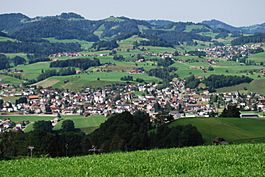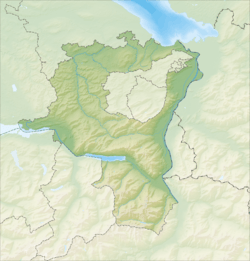Bütschwil facts for kids
Quick facts for kids
Bütschwil
|
||
|---|---|---|
 |
||
|
||
| Country | Switzerland | |
| Canton | St. Gallen | |
| District | Toggenburg | |
| Area | ||
| • Total | 13.79 km2 (5.32 sq mi) | |
| Elevation | 610 m (2,000 ft) | |
| Highest elevation
(Sedelberg)
|
942 m (3,091 ft) | |
| Lowest elevation
(Thur river)
|
555 m (1,821 ft) | |
| Population
(Dec 2011)
|
||
| • Total | 3,365 | |
| • Density | 244.02/km2 (632.0/sq mi) | |
| Postal code |
9606
|
|
| Surrounded by | Ganterschwil, Krinau, Lichtensteig, Lütisburg, Mosnang, Oberhelfschwil, Wattwil | |
Bütschwil was once a town, or "municipality," in the Toggenburg area of St. Gallen canton in Switzerland. On January 1, 2013, Bütschwil joined with another town called Ganterschwil. Together, they formed a new, larger town named Bütschwil-Ganterschwil.
Contents
History of Bütschwil
Bütschwil is a very old place. The first time anyone wrote about it was in the year 779. Back then, it was called Bucinesvilare.
Geography of Bütschwil
In 2006, Bütschwil covered an area of about 13.7 square kilometers (5.3 square miles). A large part of this land, about 66%, was used for farming. Forests covered almost 20% of the area. Buildings and roads took up about 12% of the land. The rest, a small 1.5%, was made up of rivers or lakes.
The town was located in the Toggenburg district, right along the Thur river. On one side of the Thur river were the main villages of Bütschwil and Dietfurt. There were also smaller groups of houses, called hamlets, like Grämigen and Kengelbach. On the other side of the river, you could find the hamlets of Langensteig and Laufen.
Bütschwil's Coat of Arms
The coat of arms for Bütschwil is red. It shows two white swan heads that are cut off at the neck. These swan heads are woven together in a special way.
People of Bütschwil (Demographics)
In 2011, about 3,365 people lived in Bütschwil. About 15.7% of these people were from other countries. Most people in Bütschwil speak German. This was about 88% of the population in 2000. Other languages spoken included Albanian and Serbo-Croatian.
In 2000, about 13.6% of the people were children aged 0 to 9 years old. Teenagers, aged 10 to 19, made up 17% of the population. Most adults were between 20 and 59 years old. About 20% of the population was 60 years or older.
Many people in Bütschwil lived in families. In 2000, about 63% of people lived in homes with a couple and their children. About 17.5% were couples without children. Around 9.5% of people lived alone.
In the 2007 national election, the SVP was the most popular party. They received about 36.5% of the votes. The CVP was also very popular, with 35.2% of the votes.
Most people in Switzerland have a good education. In Bütschwil, about 62% of adults (aged 25-64) had finished high school or gone on to college. In 2000, about 26% of the people had finished primary school. About 31% had finished secondary school.
Here is how the population of Bütschwil has changed over time:
| year | population |
|---|---|
| 1827 | 1,750 |
| 1850 | 1,961 |
| 1900 | 2,869 |
| 1910 | 3,149 |
| 1950 | 3,379 |
| 1990 | 3,632 |
| 2000 | 3,550 |
Things to See in Bütschwil
The village of Bütschwil is considered an important Swiss heritage site. This means it has special historical or cultural value.
Bütschwil's Economy
In 2007, the unemployment rate in Bütschwil was very low, at about 1.14%. In 2005, many people worked in different types of jobs.
- Farming: About 209 people worked in farming and related businesses.
- Manufacturing: About 573 people worked in factories and making things.
- Services: About 705 people worked in jobs like shops, offices, and healthcare.
In 2000, 767 people worked in Bütschwil itself. However, 931 people who lived in Bütschwil traveled to other towns for work. Also, 544 people came into Bütschwil from other places to work.
Religion in Bütschwil
According to a survey in 2000, most people in Bütschwil were Roman Catholic. This was about 67.7% of the population. About 13.3% belonged to the Swiss Reformed Church. There were also people who belonged to the Orthodox Church, other Christian churches, and Islam. A small number of people did not belong to any church.
See also
 In Spanish: Bütschwil para niños
In Spanish: Bütschwil para niños




